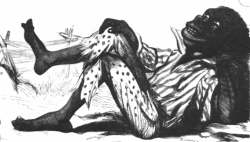 A response to my Indian Comics Irregular essay Mark Twain, Indian Hater:
A response to my Indian Comics Irregular essay Mark Twain, Indian Hater: A response to my Indian Comics Irregular essay Mark Twain, Indian Hater:
A response to my Indian Comics Irregular essay Mark Twain, Indian Hater:
>> Twain stereotyped and ridiculed everybody in "Huckleberry Finn". Jim was no exception. <<
Wrong. The only significant characters in the book are Huck, Jim, Tom Sawyer, the King, the Duke, and maybe Huck's father and Tom's Aunt Sally. They all look foolish at times, but Twain made Jim worse—like a foolish child, not a foolish adult. No other character is close to being as ignorant and superstitious—except maybe Huck, a boy half Jim's age.
Jim may have solid morals, but a dog can be loyal, honest, and true. That doesn't make him a complex adult character. It makes him a typical canine.
>> And Twain spared nothing in showing how Jim was so poorly treated -- it drove home how and why African Americans hate the second word to the full title of Richard Pryor's Bicentennial album. <<
When was the last time you read the book? I'm rereading it now. Far from sparing "nothing," Twain spared almost everything. Jim flees because he's afraid of being sold...one mother is sold separately from her children (a problem the book soon rectifies)...and that's about it. There's almost nothing describing the evils of slavery.
When Jim flees captivity near the end and the whites recapture him, they talk about hanging him for a moment. But the worst punishment they dish out is cussing and cuffing, and Tom's relatives put a halt to that quickly because Jim has proven he's "good." Then a letter freeing Jim arrives, and Tom says he knew about Jim's freedom all along.
The message? Be a good "darky" and paternalistic white children will help you get free. This has nothing to do with reality, where all the paternalistic white children in the world couldn't help a slave no matter how saintly he was. In reality, Jim probably would've been hung or whipped within an inch of his life.
Why should a black man have to "earn" his freedom at all by being better than his peers? Twain wasn't condemning slavery as an institution, he was condemning the enslavement of one exceptional black person. Every other black remains a slave at the end, and it's doubtful Huck or Twain gave them a second thought.
Twain's slaves are a happy-go-lucky, compliant bunch of darkies—the classic stereotype seen in Gone with the Wind and countless Aunt Jemima commercials. The pain and suffering evident in a Roots is absent. Perhaps Twain's readers were intimately familiar with the subject, but Twain spared them any recitation of the horrors they so recently tolerated.
>> Twain wasn't racist. He hated everybody. Read his later works, he was quite the misanthrope. <<
I've read a lot of them. Did you read the excerpts at Mark Twain, Indian Hater? As far as I know, Twain's attacks on Indians go far beyond anything he said about another race.
Being misanthropic toward individuals or a class of people (e.g., politicians) doesn't compare to being misanthropic toward an entire race. The latter is a higher order of misanthropy. Besides, if you single out a group of people based on racial characteristics, that's called "racism," regardless of whatever else you've done.
And some thoughts on my "Good Indian" comment:
>> Define safe? <<
Unchallenging. Uncritical. Supporting the status quo.
>> Are you saying the media should portray negative images of people as well as positive ones? <<
Yes. More precisely, it should present accurate images, whether they're negative or positive.
>> Isn't objective accuracy the enemy of political correctness? <<
Yes, and we rarely see objective accuracy in today's media portrayals. Look at any middle-class TV or movie comedy about a school, for instance. Does it show a third of the kids failing, poverty, drug use, gangs, discipline problems, bullying, decaying roofs, clogged toilets, missing textbooks, overwhelmed counselors, cheating, overeating and anorexia, etc., etc.? Not that I've seen. What we see are safe portrayals of schools, which reinforce the conservative notion that the "system" is okay and "we" need to try harder.
In short, I'm all for objective accuracy. I don't think Twain was objectively accurate, and I know our Pocahontas and Squanto myths aren't. Am I missing any examples of objective accuracy?
|
. . . |

|
All material © copyright its original owners, except where noted.
Original text and pictures © copyright 2007 by Robert Schmidt.
Copyrighted material is posted under the Fair Use provision of the Copyright Act,
which allows copying for nonprofit educational uses including criticism and commentary.
Comments sent to the publisher become the property of Blue Corn Comics
and may be used in other postings without permission.